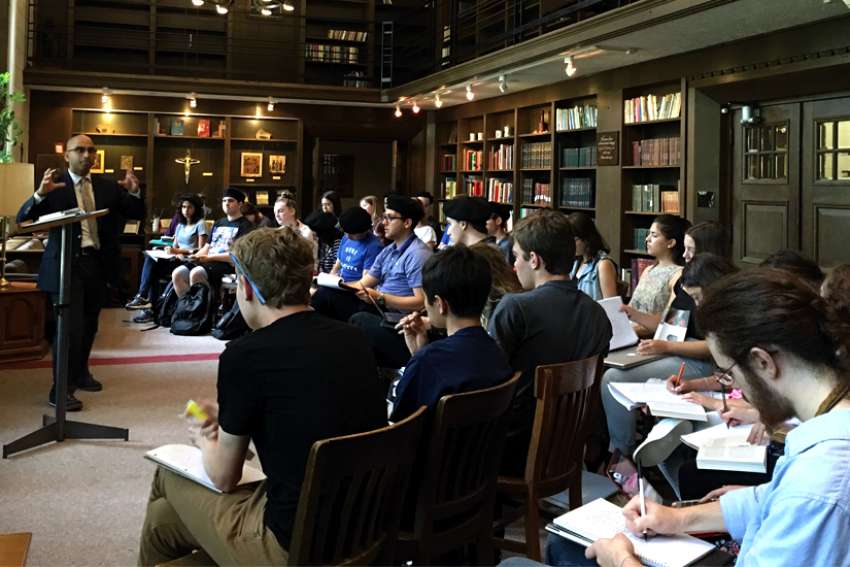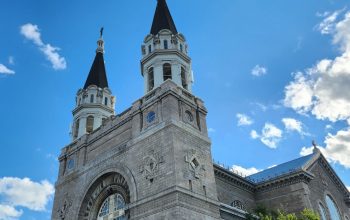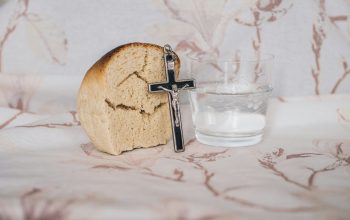Photo Credit: University of St. Michael’s College
Personal testimonies from members of USMC’s Gilson Seminar in Faith and Ideas
Jonas Cardenas, Isabel Padolina, Joseph Pontisso, and Sophie Rohrer, Contributors
In recent weeks, members past and present of the Gilson Seminar in Faith and Ideas (Gilson) learned that the class would not be running next year. For the past six years, Gilson has been a seminar course for first-year students at the University of St. Michael’s College (USMC) that asks serious questions of how faith, in concert with reason, is exercised and understood in daily life, in the sciences and humanities, and in public affairs. Taught by Professor (and former USMC principal) Randy Boyagoda, along with two postdoctoral fellows, it draws from a rich collection of works connected by the broad concept of the Catholic Intellectual Tradition. It also features a travel component, in which students spend approximately two weeks in Rome as part of the course. What good is a course like Gilson within a historically Catholic college, let alone a large secular university? The testimonies of two “Gilsonians” (one who took the class a few years ago, and one in this year’s class) are given here as answers to this question. This is what Gilson means to them, what it has given them, and what the seminar still promises for the future, despite its recent discontinuation.
Isabel, Gilson 3 (2019–20): How do you write about something that has meant so much to you, to the point that words fall short? Gilson is one such thing. It was more than a class or an experience; it was life changing.
One of the main attractions to Gilson is the trip to Rome, and after two years of waiting due to COVID-19, I was able to go with my class in my third year. I had always wanted to go to Rome, and since the material would be related to the Toronto course from first-year, I had high hopes. It was as if everything I had studied came together on that trip. We discussed topics like art and science, and then saw them in person. It was more than simply learning in Rome — one can learn anywhere. But to be immersed in what you are studying? That is something else. That, for me, was a testament to the fact that courses like Gilson are essential to a university. Professor Boyagoda fostered a desire to dig deeper to find the truth and the faith in subjects where some might not see a connection to faith right away. We saw the direct influence that Christianity has had (and still has) on science, art, architecture, and more.
But I never expected to come out with so much more than knowledge. In talking to past and present Gilsonians and even those who heard about Gilson indirectly, they all said the same thing: Professor Boyagoda created a family. Being a Gilsonian means that you are part of something special, and once a fellow Gilsonian knows you are part of Gilson, it expands that family. Gilson is the bridge connecting people and subjects from various backgrounds to one common goal: a desire for truth.
Joseph, Gilson 6 (2022–23): I can barely believe that I am scheduled to go to Rome in less than two months! I had hoped to be part of Gilson since I first heard of the seminar, all the way back when I started high school. The stories I have heard from my older peers — the experiences, inspirations, and antics of past members — have built up the anticipation in a way only a seminar such as Gilson can. The amazing thing is that I have complete confidence that the remainder of the seminar (and my trip to Rome) will meet my already-high expectations. Having already been part of many wonderful experiences with my current Gilson classmates, I have no doubt that the future will hold many more.
One of the things that has struck me about the seminar is the way first-year students, like me, have been able to engage in such positive and productive discussions. Such discussions often take place under the supportive eyes of our professor and TAs — Thomas and Robin — but they also happen outside of class, of our own initiative. Although Professor Boyagoda often says that an intellectual is “one who is willing and capable of unnecessary thought,” I have a strong sense that what we do in Gilson (Faith and Ideas) is truly important, and I have a genuine desire to engage the many concepts tied to Faith and Ideas. I see this sentiment expressed by my Gilson peers as well. As I look forward to the endless possibilities that ten days in Rome can provide, I hope that others in the future can have the same sorts of experiences: both of travel and of positive engagement with Faith and Ideas.
Another Gilsonian simply quoted the late Chadwick Boseman: “An offering from a sage and a king is more than silver and gold. It is a seed of hope, a bud of faith.” Drs. Boyagoda, Guthrie, Pinkoski, and Çiftçi, along with Robin, Thomas, Mike, Natalie, Sam, and all the friends and mentors who have taught and accompanied us in our time in this university, have gifted us precisely these things.




